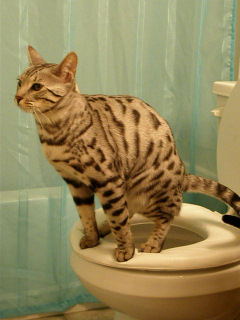They are making several good points on the subject of How to Dispose of Cat Poop and Litter Without Plastic Bags as a whole in this content followed below.

Intro
As feline owners, it's necessary to be mindful of how we get rid of our feline friends' waste. While it may appear practical to purge pet cat poop down the toilet, this method can have detrimental repercussions for both the setting and human wellness.
Alternatives to Flushing
Thankfully, there are safer and extra responsible ways to throw away pet cat poop. Take into consideration the adhering to choices:
1. Scoop and Dispose in Trash
One of the most usual technique of disposing of cat poop is to scoop it right into a naturally degradable bag and toss it in the trash. Be sure to use a committed trash scoop and take care of the waste without delay.
2. Usage Biodegradable Litter
Go with naturally degradable pet cat litter made from materials such as corn or wheat. These trashes are environmentally friendly and can be securely thrown away in the trash.
3. Hide in the Yard
If you have a lawn, consider burying pet cat waste in a designated location away from vegetable gardens and water resources. Be sure to dig deep adequate to prevent contamination of groundwater.
4. Mount a Pet Waste Disposal System
Purchase an animal garbage disposal system especially designed for cat waste. These systems make use of enzymes to break down the waste, decreasing odor and environmental effect.
Health and wellness Risks
In addition to environmental worries, purging feline waste can also present health dangers to humans. Pet cat feces may have Toxoplasma gondii, a parasite that can create toxoplasmosis-- a potentially extreme disease, particularly for expecting women and people with weakened immune systems.
Ecological Impact
Purging pet cat poop introduces unsafe virus and bloodsuckers right into the water, posturing a considerable threat to marine environments. These pollutants can adversely impact marine life and concession water top quality.
Verdict
Accountable family pet ownership extends beyond offering food and shelter-- it also involves proper waste management. By avoiding flushing cat poop down the toilet and opting for alternate disposal techniques, we can minimize our ecological footprint and secure human wellness.
Why You Should Never Flush Cat Poop Down the Toilet
A rose by any other name might smell as sweet, but not all poop is created equal. Toilets, and our sewage systems, are designed for human excrement, not animal waste. It might seem like it couldn’t hurt to toss cat feces into the loo, but it’s not a good idea to flush cat poop in the toilet.
First and foremost, assuming your cat uses a litter box, any waste is going to have litter on it. And even the smallest amount of litter can wreak havoc on plumbing.
Over time, small amounts build up, filling up your septic system. Most litter sold today is clumping; it is made from a type of clay that hardens when it gets wet. Ever tried to scrape old clumps from the bottom of a litter box? You know just how cement-hard it can get!
Now imagine just a small clump of that stuck in your pipes. A simple de-clogger like Drano isn’t going to cut it. And that means it’s going to cost you big time to fix it.
Parasitic Contamination
Believe it or not, your healthy kitty may be harboring a nasty parasite. Only cats excrete Toxoplasma in their feces. Yet it rarely causes serious health issues in the cats that are infected. Most people will be fine too if infected. Only pregnant women and people with compromised immune systems are at risk. (If you’ve ever heard how women who are expecting are excused from litter cleaning duty, Toxoplasma is why.)
But other animals may have a problem if infected with the parasite. And human water treatment systems aren’t designed to handle it. As a result, the systems don’t remove the parasite before discharging wastewater into local waterways. Fish, shellfish, and other marine life — otters in particular — are susceptible to toxoplasma. If exposed, most will end up with brain damage and many will die.
Depending on the species of fish, they may end up on someone’s fish hook and, ultimately on someone’s dinner plate. If that someone has a chronic illness, they’re at risk.
Skip the Toilet Training
We know there are folks out there who like to toilet train their cats. And we give them props, it takes a lot of work. But thanks to the toxoplasma, it’s not a good idea.
:max_bytes(150000):strip_icc()/0S1A1090-49a8e2c66f8e41d6901f2559787a7f24.jpg)
I discovered that blog posting on How to Dispose of Cat Poop and Litter Without Plastic Bags when scouting around the search engines. Appreciated our post? Please share it. Let another person check it out. I praise you for your time. Come back soon.
Call Today